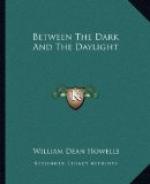By the time Alford had co-ordinated this reflection with the other, the eidolon had faded from the lady’s face, which again presented itself in uninterrupted loveliness with the added attraction of a distinct pout.
“Well, Mr. Alford!” she bantered him.
“Oh, I beg your pardon! I was thinking—”
“Not of what I was saying,” she broke in, laughingly, forgivingly.
“No, I certainly wasn’t,” he assented, with such a sense of approaching creepiness in his experience that when she challenged him to say what he was thinking of, he could not, or would not; she professed to believe that he would not.
In the joking that followed he soon lost the sense of approaching creepiness, and began to be proud of what had happened to him as out of the ordinary, as a species of psychological ecstasy almost of spiritual value. From time to time he tried, by thinking of the splash and upward gush from the cannon-shot’s plunge in the sea, to recall the vision, but it would not come again, and at the end of an afternoon somewhat distraughtly spent he decided to put the matter away, as one of the odd things of no significance which happen in life and must be dealt with as mysteries none the less trifling because they are inexplicable.
“Well, you’ve got over it?” the widow joked him as he drew up towards her, smiling from her rocker on the veranda after supper. At first, all the women in the hotel had petted him; but with their own cares and ailments to reclaim them they let the invalid fall to the peculiar charge of the childless widow who had nothing else to do, and was so well and strong that she could look after the invalid Professor of Archaeology (at the Champlain University) without the fatigues they must feel.




